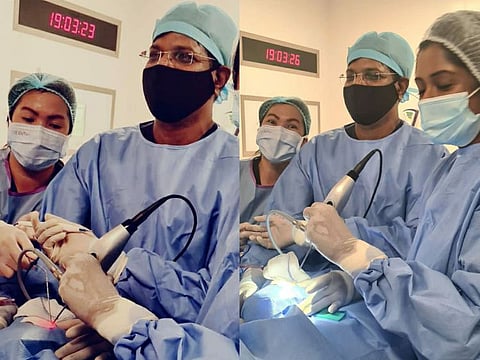Eight-day-old Emirati baby in Abu Dhabi gets to breathe, feed normally after lifesaving procedure
Rare nasal block prevented newborn boy from being able to feed or breathe

Abu Dhabi: A lifesaving surgery in the capital has finally enabled an eight-day-old Emirati baby to breathe and feed regularly.
The baby boy was born with a rare congenital disorder, known as bilateral bony choanal atresia, in which the nasal passage remains blocked. The first child of an Emirati couple, he developed severe respiratory distress soon after delivery, and was put on life support when doctors found that he could not breathe.
Hospital transfer
At two days old, the newborn was transferred to Burjeel Medical City for advanced treatment.
“It broke our heart to see our baby with tubes in his nose and wires on his chest. Nobody in our family had been born with this condition,” the father said, recounting the experience.
Rare condition
Doctors at Burjeel Medical City confirmed the diagnosis of bilateral bony choanal atresia, which is known to occur only once in about 7,000 live births.
“We found that he could not breathe through his nose. Babies are nasal breathers. They will only breathe through their nose in the first three months,” said Dr Musaddaq Inayat, consultant neonatologist at the hospital. While he struggled to breathe, the baby boy was also only able to feed through a nasogastric tube.
Tissue removal
“[The bony tissue blocking his nasal passage] had to be removed for the child to breathe on his own,” explained Dr Vandana Binu, specialist otolaryngologist at Burjeel Medical City.
“Operating on a newborn requires proper planning and preparation. There should be a detailed plan. After frequent deliberation, we chose to opt for the endoscopic endonasal binostril approach,” she added.

Successful procedure
The two-and-a-half-hour endoscopic procedure involved the complete removal of the thick bony tissue. Surgeons used modern infant endoscopic microsurgical instruments to perform the surgery.
“The procedure was successful. The baby was stable and we moved him to room care the next day. On the second day, he had started to feed without any support,” said Dr Rajasekhar Cingapagu, specialist paediatric surgeon at the hospital.
Grateful parents
The baby’s parents were relieved about the outcome. “The medical staff has been cordial and warm towards us. They kept updating us on the status of our son and the treatment. By the grace of God, he is doing well now. His condition has improved a lot,” the father said.
Doctors also checked for associated problems in other vital organs, including the brain and heart, and everything appeared to be normal. The baby was soon discharged and was doing well at his two-week check last month.
Sign up for the Daily Briefing
Get the latest news and updates straight to your inbox



